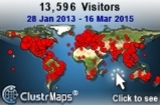In 1969, Sir Arthur Charles Clarke, CBE, FRAS, Sri Lankabhimanya published his most famous novel “2001: A Space Odyssey,” which was subsequently turned into a movie with the aid of Stanley Kubrick. The whole of the story of “2001: A Space Odyssey” was based off of Clarke’s 1948 short story “The Sentinel,” which was published under the title “Sentinel of Eternity” in 1951. Most people know about the novel, and the movie, but not the short story. To be fair, I only ran across the short story after picking up an Arthur Charles Clarke anthology some time ago at the “All Booked Up” used bookstore many years ago.
But I ran across and interesting passage near the start of the modern era of the story a few days ago, while browsing through in order to kick-start my brain out of holiday idleness. The passage is priceless for its foresight, and as a counter argument to the naysayers that question the value of speculative and science fiction. Here is the quote from “2001: A Space Odyssey”:
“There was plenty to occupy his [Dr. Heywood Floyd] time, even if he did nothing but sit and read. When he tired of official reports and memoranda and minutes, he would plug his foolscap-sized Newspad into the ship’s information circuit and scan the latest reports from Earth. One by one he would conjure up the world’s major electronic papers; he knew the codes of the more important ones by heart, and had no need to consult the list on the back of his pad. Switching to the display unit’s short-term memory, he would hold the front page while he quickly searched the headlines and noted the items that interested him.
Each had its own two-digit reference; when he punched that, the postage-stamp-sized rectangle would expand until it neatly filled the screen and he could read it with comfort. When he had finished, he would flash back to the complete page and select a new subject for detailed examination.
Floyd sometimes wondered if the Newspad, and the fantastic technology behind it, was the last word in man’s quest for perfect communications. Here he was, far out in space, speeding away from Earth at thousands of miles an hour, yet in a few milliseconds he could see the headlines of any newspaper he pleased. (That very word “newspaper,” of course, was an anachronistic hangover into the age of electronics.) The text was updated automatically on every hour; even if one read only the English versions, one could spend an entire lifetime doing nothing but absorbing the ever-changing flow of information from the news satellites.
It was hard to imagine how the system could be improved or made more convenient. But sooner or later, Floyd guessed, it would pass away, to be replaced by something as unimaginable as the Newspad itself would have been to Caxton or Gutenberg.
There was another thought which a scanning of those tiny electronic headlines often invoked. The more wonderful the means of communication, the more trivial, tawdry, or depressing its contents seemed to be. Accidents, crimes, natural and man-made disasters, threats of conflict, gloomy editorials – these still seemed to be the main concern of the millions of words being sprayed into the ether. Yet Floyd also wondered if this was altogether a bad thing; the newspapers of Utopia, he had long ago decided, would be terribly dull.”
Setting aside the specific details of codes, verse URLs, which incidentally are backed up by IP Address “codes,” Clarke pegged internet news pretty well. The speed of updating was a bit off too, given that my own blog can can and does post through to several different social media websites in a matter of seconds, and updates my blog space even faster. But what I find the most interesting is Clarke’s vision of the hand-held tablet, with icons the size of “postage-stamps” growing to fill the screen. I remember the old Tandy TRS-80 computers with their choice of white or green text on a black screen, where graphics were all but plotted one pointillistic Pixel at a time.
And perhaps the most telling in the soft rebuke inherent in Clarke’s closing paragraph; not that Utopia would be boring. I think that misses the point. But that mankind, humanity inclusive of all, will have changed very little, despite all of our technological advances. While Clarke was wrong about the stay power of the Union of Soviet Socialist Republics, he has not been wrong about the staying power of the Chinese “empire,” nor about the lasting international tensions between Russia, China, and the United States.
Alas, Clarke was overly optimistic about humanity’s interest in settling the stars. I think that this has a great deal to do with our effectively (meaning technology-wise) solving the problems of over population and feeding our collective mouths. We have not however, solved the political issues that allow millions of metric tons of food to be wasted in wealthy countries because it would not be “cost effective” to feed those that starve, or because it would “violate the freedoms” of some unknown billionaire to be a greedy wasteful prick. But, I digress. So in a way, Clarke was still right about the pressing issues of our global population– those issues are still pressing. But the problem is a lack of effective governmental organization. Which incidentally, turns out to be a major issue as the story of “2001: A Space Odyssey” progresses.
You can find the complete text of the short story “Sentinel of Eternity,” by Sir Arthur Charles Clarke, CBE, FRAS, Sri Lankabhimanya here at “Torchy Humor Tale,” by Bill Ward on Tumblr.













